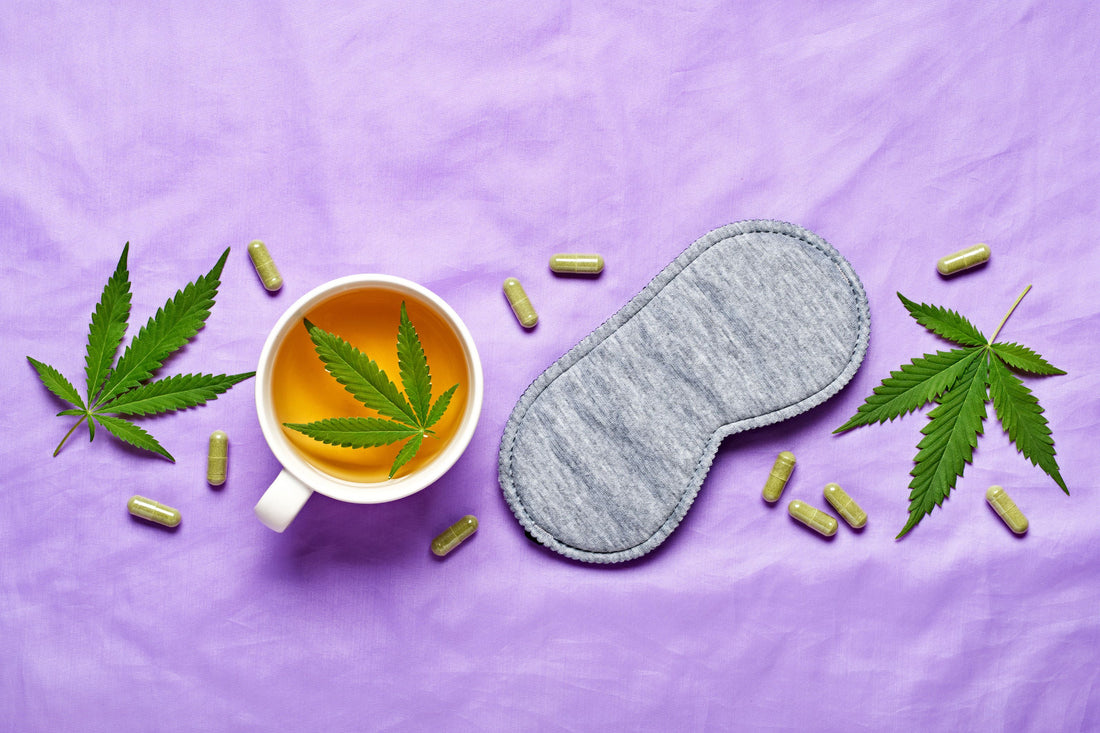The Secret to a Good Night's Rest? CBD May Be the Answer

CBD, short for cannabidiol, is a natural compound found in cannabis plants. Unlike THC, the psychoactive compound that produces the “high” feeling from marijuana, CBD does not cause any intoxication or impairment. Instead, CBD interacts with receptors throughout the brain and body to influence various processes including mood, pain perception, immune function, stress response, and sleep cycles.
With growing interest in holistic wellness and natural remedies, many people are turning to CBD as a way to promote healthy sleep and tackle issues like insomnia. But how exactly does CBD work to improve sleep? Is it safe and effective? What’s the best way to take it? This beginner’s guide will explore the science behind CBD and sleep and provide tips for optimizing your routine.
How CBD Affects Sleep
Extensive research over the past decade has uncovered how CBD can positively influence sleep in a number of ways:
Reduces Anxiety and Stress
One of the most well-studied effects of CBD is its ability to reduce feelings of anxiety and calm the nervous system. Chronic stress and anxiety are primary culprits for insomnia and other sleep struggles. By lowering cortisol and regulating the “fight or flight” stress response, CBD can pave the way for better sleep quality. Studies confirm CBD’s anti-anxiety benefits for conditions like OCD, PTSD, and social anxiety.
Promotes Relaxation and Calm
In addition to alleviating anxious thoughts, CBD also promotes an overall sense of relaxation in the body. Studies found CBD decreased psychological arousal and discomfort, key factors that inhibit restful sleep. Many users also report CBD makes them feel less restless at bedtime, with an enhanced sense of calm.
Regulates Sleep Cycles
Emerging evidence suggests CBD may help regulate circadian rhythms (the sleep-wake cycle) and support restorative REM and deep sleep stages. In studies of Parkinson’s patients, for example, CBD increased overall sleep amounts and quality. Researchers believe CBD may interact with dopamine receptors involved in sleep regulation. More human studies are still needed in this area.
The reason CBD can impact sleep is due to its effects on the body’s endocannabinoid system. This system regulates various processes including mood, pain perception, appetite, cognitive performance, and sleep. CBD interacts with endocannabinoid receptors throughout the central nervous system and immune system, indirectly influencing these functions.
Using CBD for Insomnia
Those struggling with insomnia have difficulty falling asleep, staying asleep through the night, or don’t feel adequately rested after sleep. Common causes include chronic stress, anxiety, pain, medication side effects, and disrupted circadian rhythms. Research indicates CBD may help alleviate insomnia in several ways:
Fall Asleep Faster: CBD’s anti-anxiety properties can make it easier to quiet mental chatter and find a calm state conducive to drifting off without restlessness or rumination.
Stay Asleep Longer: CBD has shown potential to improve sleep quality and duration. By reducing nighttime awakenings and disruptions, those with insomnia can sleep deeper and wake less often throughout the night.
Less Daytime Drowsiness: More consistent and high-quality sleep from CBD results in fewer negative side effects like fatigue, irritability, and lack of focus/productivity during the day.
Most experts recommend taking CBD 30-60 minutes before bedtime for best effects. Start with a lower dose around 10-20mg and increase gradually as needed until the optimal dosage for your body is reached. Be patient and consistent with your CBD routine, as effects compound over several weeks of sustained use.
Improves Overall Sleep Quality
Research also indicates CBD can enhance overall sleep quality in multiple ways. It has been shown to increase total sleep amounts, allowing for longer and consistent rest. CBD also appears to promote deeper REM and slow wave sleep stages that are most restorative. Additionally, it may reduce the number of nighttime awakenings and disruptions, resulting in fewer intermittent wake-ups. The reason CBD can impact sleep is due to its interaction with the body's endocannabinoid system.
CBD vs Other Sleep Aids
How does CBD stack up against other common pharmaceutical sleep aids like over-the-counter antihistamines (diphenhydramine, doxylamine) and prescription hypnotics (zolpidem, eszopiclone)?
Antihistamines like Benadryl can provide mild sedation, but often result in side effects like next-day drowsiness, dry mouth, dizziness, and urinary retention. The body can also build tolerance quickly.
Prescription hypnotics are highly effective for inducing sleep yet risk building dependence and impairment. Additional side effects include headache, unusual dreams, amnesia, and nausea. Overdose can also be dangerous.
In contrast, CBD is considered very safe and well-tolerated by most users. Potential side effects include slight dry mouth, dizziness, GI discomfort, and sedation in high amounts. CBD is not associated with negative effects on cognition or motor control. It also does not carry risk of breathing problems during sleep like some prescription pills.
Perhaps most importantly, CBD is non-habit forming and does not produce chemical dependency, in contrast to sleep medications like Ambien and Lunesta. For these reasons, many individuals struggling with insomnia prefer natural CBD over pharmaceutical options. While more research is still needed, existing evidence points to CBD as a promising treatment for sleep disturbances.

Is CBD Safe? Potential Side Effects and Considerations
When considering trying CBD for sleep or other purposes, one common question is: is CBD safe to use? Here's what the research says so far:
Overall, CBD is very well-tolerated by most users and considered safe at the recommended doses. Minor side effects can include:
Dry Mouth: CBD can reduce saliva production temporarily. Drink water to offset.
Dizziness: Higher doses may cause lightheadedness or drowsiness. Lower dose if this occurs.
Digestive Upset: CBD can affect gut motility. Take with food to minimize stomach discomfort.
Liver Enzymes: High doses of CBD may affect liver enzyme (CYP450) processing of other drugs. Check with doctor about interactions.
Larger CBD doses above 150mg have been associated with some negative side effects like anxiety, increased heart rate, and sedation. Start with low doses to assess tolerance.
Note CBD can increase the blood thinning effects of warfarin and block metabolism of certain seizure medications. Discuss using CBD with a healthcare professional if taking other medications.
Avoid using CBD while pregnant or breastfeeding, as potential risks to the baby currently remain unknown. Also steer clear if you have Parkinson's disease, as CBD may exacerbate symptoms.
Overall, moderate consumption of hemp-derived CBD oil appears very low risk for most adults according to existing research. But consulting a doctor is still recommended, especially for those on medications or with health conditions. Proper dosing and buying high quality CBD products from reputable brands also helps maximize safety and minimize any side effects.
Optimizing Your CBD Routine for Sleep
What are some best practices when using CBD to promote healthy sleep patterns?
Timing: Take CBD 30-60 minutes before bedtime for optimal effect. Finding your body’s ideal window can take some trial and error. Avoid taking CBD too close to actual bedtime, which can have the opposite effect.
Dosage: Most people benefit from doses of 15-50mg though some require higher amounts up to 100mg. Start low and increase slowly as needed. Track sleep quality diligently at different dosages.
Delivery Method: Oils, tinctures, edibles, capsules, and vapes are common options. Choose a method that best fits your lifestyle and preferences. Try instant vs. time-released formulas.
Lifestyle Support: Limit blue light exposure at night, keep bedroom cool and dark, avoid heavy meals before bed, reduce caffeine (especially late day), and add relaxing wind-down rituals.
Synergistic Supplements: Some users pair CBD with natural sleep aids like melatonin, valerian root, magnesium, glycine, or chamomile for enhanced benefits. Discuss combos with your healthcare provider.
Consistency: It can take several weeks of sustained CBD use for sleep effects to fully manifest. Stick with your routine and rest assured the benefits will build over time. Sleep hygiene also cannot be overlooked.
Relaxation & Unwinding with CBD
In addition to promoting more restful sleep, CBD can also boost relaxation and calm during the day. The compounds interact with brain receptors involved in regulating stress response, anxiety, and discomfort. While larger human studies are still needed, the existing science is promising for CBD’s use in relaxation.At Jeng, we're thrilled about the natural benefits of hemp-derived CBD for promoting healthy sleep and relaxation. Our CBD-infused cocktails contain broad spectrum CBD, meaning you get all the calming benefits of the hemp plant without worry over THC. We've specifically formulated our beverages as part of your perfect evening wind-down routine. Sip our CBD cocktails before bed to help quiet your mind, ease muscular tension, and pave the way for deeper, more restorative sleep all night long. The anti-anxiety qualities of CBD combine with relaxing terpenes and botanicals for what we like to call "tranquility in a glass". Be sure to follow general sleep hygiene tips as well like limiting blue light exposure at night and keeping your bedroom cool and dark. Then let our CBD cocktails work its magic so you wake up feeling refreshed and ready to shine.

